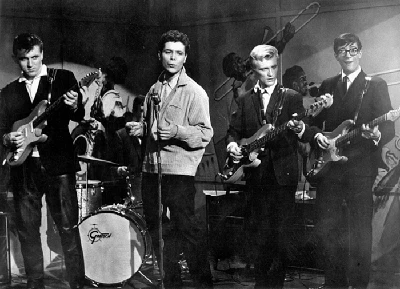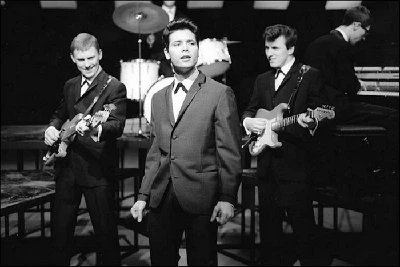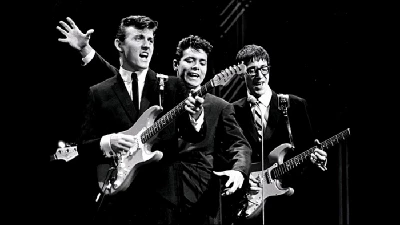published: 24 /
12 /
2019

Bob Nicholson asks if the legacy of Cliff Richard and the Shadows and their influence on the British pop/rock movement has ever been properly recognized or whether they remain under-acknowledged.
Article
In the beginning, there was nothing. Then came the Big Bang and our world was created. That’s how many music chroniclers regard the explosion in British pop/rock detonated by The Beatles. You could be forgiven for thinking nothing worthwhile happened before - You’d be wrong.
Before Columbia released 'Move It' by Cliff Richard and The Drifters in August 1958, the British pop/rock music market was dominated by US artists along with middle of the road British singers as diverse as Frankie Vaughan and Ruby Murray, Dickie Valentine and Jimmy Young. Then there was movement. The skiffle boom introduced guitar music to the teen population, inspired by Lonnie Donegan, and Tommy Steele took his chance to become Britain’s first pop star. Still, the Americans had a stranglehold. It was the arrival of 'Move It' that changed the game for British pop/rock.
Cliff and The Shadows (as The Drifters became) were pre-eminent during the period September 1958 to May 1963. Curiously, the writers documenting that period continue to overlook their wider importance to the British industry. They tend to include Cliff alongside contemporaries like Marty Wilde, Adam Faith and Billy Fury without making clear the greater success and long-term impact that Cliff and The Shadows had.
Their success was not an accident. It was a result of hard work, talent and shrewd judgement, not least by Cliff himself. He saw The Drifters/Shadows and himself as a unit from the outset. He was ruthless in ensuring that only the best survived, removing his friends Terry Smart from drums and Ian Samwell from guitar. Their replacements, Hank Marvin, Bruce Welch and Tony Meehan (Brian Bennett from 1961), were several notches up in terms of musical ability. He imported the first Fender Stratocaster for Hank to improve The Shadows’ sound. He pressed producer Norrie Paramor to sign them and ensured they were involved in all his films. They were named on all Cliff’s singles. This exposure emphasised Cliff and The Shadows as a single unit in the public’s mind. Musicians backing Cliff’s competition were not identified in the same way.
Cliff’s early British competition came from Marty Wilde who was much admired. Yet Marty was essentially a covers artist, notwithstanding 'Bad Boy' which he wrote. Five of his six top ten hits were covers of American hits. He was lead on Jack Good’s Oh Boy! Show on ABC TV until Cliff was recruited and eventually became, with the Drifters, the lead act. Adam Faith had two Number Ones and a successful album; Billy Fury charted regularly but didn’t achieve a Number One; Tommy Steele and Lonnie Donegan had disappeared from the charts by 1962. Cliff and The Shadows moved on to another, higher level.
Their performance on the chart in the period demonstrates the fact. Cliff had twenty-five hits of which seven were Number One and thirteen made the Top Ten. The Shadows had twelve hits of which five were Number One, the remaining seven reaching the Top Ten. Given that The Shadows backed Cliff on twenty-four of his hits, the group as a unit can be said to have a combined hits total of thirty-seven, twelve of which reached Number One and twenty made the Top Ten. Elvis had more Number Ones but was second to Cliff and The Shadows in weeks on the chart (272 to 516 for the Cliff and the Shadows and 339 for Cliff alone). Cliff had caught and would pass Elvis, his inspiration.
What was it that set them apart? Cliff’s voice, looks and stage presence in front of The Shadows’ sound. No American group sounded the same. In April 1959, Cliff bought that Fender Stratocaster from the USA after discussion with Hank. Thus, was British pop music history made. It was flamingo pink with a maple fingerboard, a tremolo arm for varying the pitch of the strings, three pickups and gold plated hardware. It looked sensational and sounded better. Soon after, guitarist Joe Brown sold Hank his echo box. The new kit, amplified by Vox AC15s, then AC30s, enabled Hank to develop his own unique style to play brilliant solos or deft, melodic tunes over a tight, powerful rhythm section. The Shadows' sound was a collaborative effort by four talented individuals. Personnel changes didn’t affect them. Meehan’s replacement by Brian Bennett, in 1961, only enhanced the group. The sound remained the same and Cliff was a beneficiary.
The fruits of that sound were in full flow on the classic 'Me and My Shadows' album, recorded at Abbey Road between March and April 1960. It was released in October 1960, reached Number Two and spent 33 weeks on the chart. By then, Apache had made The Shadows' chart-toppers in their own right. The charts were rarely without one or the other. As Cliff alternated between pop/rock and ballads to broaden his reach, The Shadows’ driving instrumentals provided a complement that kept the combined unit ahead of its competition.
Their importance to the industry usually goes unremarked yet they took British pop/rock music to new markets across the world to such effect that Cliff (and by default The Shadows) was named by Billboard as the top world music artist in 1963, ahead of Elvis. This achievement was the culmination of an overseas touring schedule that took them many times to Europe, the Far East, Australasia, Africa and The USA from 1959 onwards. Cliff recorded in French and German as part of the strategy.
In short, it was Cliff Richard and the Shadows who first made the British music industry competitive with the Americans, here and around the world. They created a distinct sound, showed shrewd business judgement in song-writing and publishing and inspired thousands of British teenagers to seek to emulate them. They provided a base for the later 1960s “Beat Boom” in the same way that Elvis and other US artists had laid the ground for them. Cliff and The Shadows were unique. They not only outperformed their rivals, they outstayed them. Their contribution should be properly recognised and honoured by music writers and commentators everywhere.
Picture Gallery:-


Visitor Comments:-
|
|
908 Posted By: Philip Goodwin, Swadlincote on 30 Dec 2019 |
It is about time that someone recognised the birth of UK Rock n Roll with Cliff & The Shadows along with their contemporaries of the day. Listen to UK Radio nowadays and you would never know that they existed despite the success that they had together and has separate entities. It did not all start with The Beatles as you quite rightly say. I just wish more people had access to their music via the so-called ‘oldies’ radio stations who quite simply ignore their influence in the late 50’s and throughout the 60’s.
|